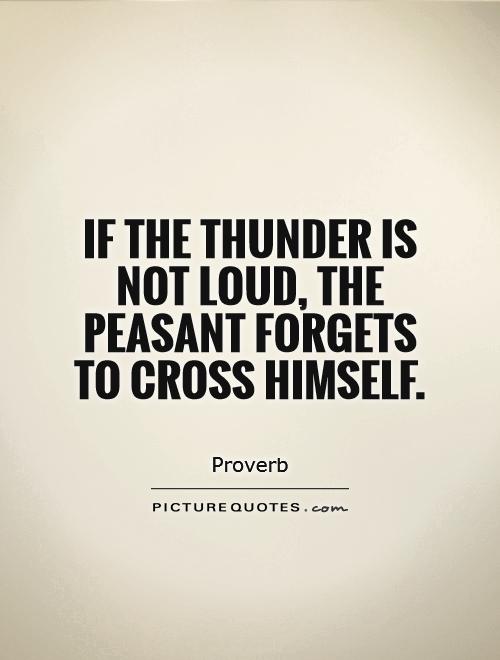If the thunder is not loud, the peasant forgets to cross himself

If the thunder is not loud, the peasant forgets to cross himself
The proverb "If the thunder is not loud, the peasant forgets to cross himself" speaks to the idea that people often only remember to take precautions or seek protection when faced with imminent danger or a sudden threat. In this case, the thunder serves as a metaphor for a powerful and potentially dangerous force that prompts the peasant to remember to cross himself, a gesture of seeking divine protection.This proverb highlights the tendency of human nature to become complacent or forgetful in times of peace or calm. When everything is going smoothly and there are no immediate threats or dangers, people may become lax in their vigilance and forget to take necessary precautions. It is only when faced with a sudden and loud reminder of potential harm, such as thunder, that they are jolted into action and remember to seek protection.
The peasant in this proverb represents the common person, who may not always be attuned to the subtle signs of danger or the need for caution. It is only when faced with a dramatic and unmistakable warning, like loud thunder, that they are reminded of the need to be vigilant and take steps to protect themselves.
This proverb also speaks to the power of fear and the role it plays in shaping human behavior. When confronted with a loud and threatening sound like thunder, people are often driven by instinct to seek safety and protection. The act of crossing oneself is a symbolic gesture of invoking divine protection and warding off evil, a practice that is often rooted in superstition and religious belief.
Overall, the proverb "If the thunder is not loud, the peasant forgets to cross himself" serves as a reminder of the importance of staying vigilant and prepared, even in times of peace and calm. It underscores the need to be mindful of potential dangers and to take precautions before it is too late.












 Friendship Quotes
Friendship Quotes Love Quotes
Love Quotes Life Quotes
Life Quotes Funny Quotes
Funny Quotes Motivational Quotes
Motivational Quotes Inspirational Quotes
Inspirational Quotes